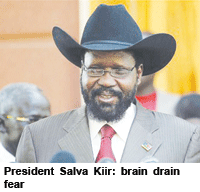Southern Sudan: New nation’s education pains
No sooner had the celebrations following the Republic of South Sudan’s independence from its northern neighbour in July last year died down than the country’s fledgling government found itself facing serious challenges, a number of them education related.
 The conflict between north and south has been ongoing since the 1950s. When the south finally achieved its independence from Khartoum on July 9, 2011, many observers felt the new nation’s prospects were promising. South Sudan has agricultural advantages beyond its less fortunate neighbours Ethiopia and Kenya. It also has large reserves of oil, gold and other minerals.
The conflict between north and south has been ongoing since the 1950s. When the south finally achieved its independence from Khartoum on July 9, 2011, many observers felt the new nation’s prospects were promising. South Sudan has agricultural advantages beyond its less fortunate neighbours Ethiopia and Kenya. It also has large reserves of oil, gold and other minerals.
After independence, the government of South Sudan wrested control of higher education from Khartoum, but soon found that developing the sector was not going to be as simple as taking over the country’s public universities: the aftermath of two civil wars had left the institutions starved of funding and resources. “From 2005 (when the second civil war ended) to July 2011, higher education institutions were under the control of the federal government in Khartoum, and they received no more than 0.2 percent of the national budget,” says John Akec, vice chancellor of the University of Northern Bahr El Ghazal.
So even though the new government of South Sudan allocated 3 percent of its first national budget to the development of higher education and 7 percent to primary and secondary education, the sector still faces a number of problems. “There are so many challenges to higher education in South Sudan, including weak standards at school level, poor infrastructure, shortage of academic staff, lack of funding for science and technology research that will have a socio-economic impact, and there are few university places for those who want to study,” says Akec.
The future of higher education is dependent on the development of general education at the primary and secondary levels. Tony Calderbank, country director for the British Council in South Sudan, says this focus is necessary because around 80 percent of South Sudan’s population is illiterate. “So it may be that they are concerned about establishing a system of universities, but the South Sudanese government’s priorities are on primary and secondary education — the focus is especially on the education of girls,” he says.
The development of general education is imperative: without it, many argue, there is no future for the country’s universities. Part of the challenge is to standardise the language in which schoolchildren are taught. South Sudan has chosen English as its state language, but many schools still teach in Arabic — the language favoured by Sudan before independence. Yet this hurdle is a small one compared with the challenges posed to the country by interruptions in oil production and the need for austerity measures.
Media reports suggest the government originally allocated only 2 percent to the higher education budget, which was then increased to 3 percent after members of parliament expressed concern. Yet Salah Khaled — head of Unesco’s Juba office — argues there was, in fact, no increase. “There was actually a budget cut and not a budget increase,” he says, citing the shutdown of oil production earlier this year due to a dispute with the north over revenue-sharing arrangements.
And if no progress is made to develop higher education, some fear South Sudan will continue to suffer from the brain drain that President Salva Kiir claims he wants to end. “Over the past decades, South Sudan has lost its best-educated people to other countries, and many fled during the war,” he said in August last year.
Kiir’s administration appears to have recognised that education is the basis for the creation of social and economic prosperity in the new state. It remains to be seen whether it will provide South Sudan’s public higher education sector with the financial and staffing resources, infrastructure and quality students it needs to carry out that task.
(Excerpted and adapted from Times Higher Education)














Add comment